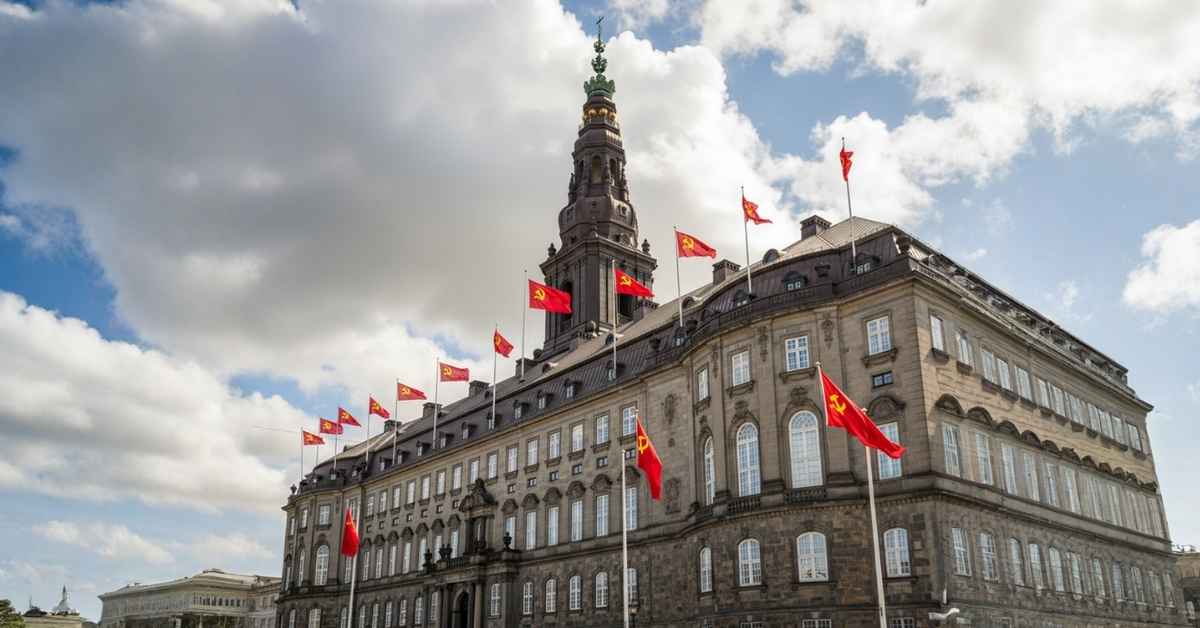Is Denmark socialist? Is this question even meaningful? In some ways, yes—because many people mistakenly believe Denmark is a socialist country. This misconception arises because Nordic countries, including Denmark, are known for their extensive welfare states and high taxes. Additionally, the Social Democratic Party has occasionally led the government. Despite its name, this party is not truly socialist, yet this has contributed to the widespread misunderstanding.
Key Points
- High political and societal freedoms in Denmark: Denmark ranks among the top countries for human and political freedoms, with high trust in government and minimal corruption, fostering a stable and attractive environment for citizens and businesses.
- Denmark’s high degree of economic freedom and property rights protection: Denmark ranks high in economic freedom indices, with strong protection of private property rights and low risk of expropriation, indicating a robust market for individuals and businesses.
- Socialism definition and global extent: Socialism broadly involves common ownership of production means controlled by the state, but few true socialist countries exist today, with most nations exhibiting a mix of market and government control.
- Denmark is not socialist but a social market economy: Denmark functions as a capitalist market economy with an extensive welfare state, supporting property rights, political freedoms, and high living standards.
- Comparison between Denmark and the USA in economic models: Denmark has higher government involvement, taxes, and welfare benefits, leading to less income inequality, whereas the US favors more personal economic freedom and limited government role.
What, then, is Denmark if it is not socialist? This article delves into that question, outlining the defining features of Danish society and its economy. We begin by examining the meaning of socialism—how it is defined—and identifying which countries in the world can currently be classified as socialist.
How is socialism defined?
Socialism is, broadly speaking, a political and economic system in which property and the means of production are owned in common, typically controlled by the state or government. Besides, socialism is also the political movement – or ideology – that strives to realize this system.
The extent of socialist countries globally
After the fall of the Berlin Wall in 1989 and the collapse of the Soviet Union in 1992, there have not been countries that call themselves socialists in Europe. So left are now only Cuba and the Asian countries China, North Korea, Laos, and Vietnam. And even these countries are not perfectly socialist.
Privately owned companies and entrepreneurs constitute an important part of the economy and are increasingly so in these countries. At the opposite extreme, there are also no perfect capitalistic free market countries with no government involvement or taxes. So it is more a question about the degree of capitalism or market economy on one side and the degree of socialist or government-controlled countries on the other.
USA is more capitalistic with less role for government and public sector than in Denmark
It is fair to say that the government and public sector is more involved in the economy in Denmark than in the USA. This applies to the level of taxes, the size of the public sector, and the degree of regulation. So the social and economic models in place are quite different. And taxes and welfare benefits in Denmark reduce income inequality more than they do in the US. So Denmark is best characterized as a social market economy.
Americans work more hours, and the tax system favors this more. And the culture in Denmark is more informal with low hierarchies in workplaces. Taking risks in business is rewarded more in the US society, and attitudes towards risks therefore differ as well.
Public opinion in the 2 countries on these topics differs as well. So, US citizens generally appreciate less government involvement, less regulation, and more personal economic freedom and responsibility than Danes. And finds high economic diversity more appropriate than the Danes do.
Denmark has a high degree of economic freedom

A relevant and well-esteemed study of this topic is the Index of Economic Freedom from The Heritage Foundation. It measures and compares countries as how economically free they are. Economic freedom is defined as a society where individuals are free to work, produce, consume, and invest in any way they please. And governments allow labor, capital, and goods to move freely. Index of Economic Freedom.
It measures economic freedom in 184 countries based on 12 quantitative and qualitative factors, grouped into four broad categories of economic freedom:
- Rule of Law (property rights, government integrity, judicial effectiveness);
- Government Size (government spending, tax burden, fiscal health);
- Regulatory Efficiency (business freedom, labor freedom, monetary freedom); and
- Open Markets (trade freedom, investment freedom, financial freedom).
The overall Index for selected countries as of 2024 on a scale of 0 to 100 is shown in the table below.
| Country | Overall Index of economic freedom. |
| Singapore | 83,5 |
| Switzerland | 83,0 |
| Denmark | 77,8 |
| USA | 70,1 |
| Mexico | 62,0 |
| Brasil | 53,2 |
| China | 48,5 |
| North Korea | 2,9 |
On the overall index, Denmark ranks as number seven in the world.
The Fraser Institute has made a similar kind of study. Here Denmark ranks as number 6 in the world as of 2022. Study from Fraser Institute.
So Denmark has a high degree of economic freedom regarding such factors. The studies also find that the standard of living (income per capita) is much higher in economically freer countries. Generally, health, education, environment etc., are also in a better condition in countries with high degrees of economic freedom.
Your property rights are well protected
A cornerstone of socialism is that the state has full ownership over the means of production. In Denmark, as in the USA and most Western countries, private property rights are protected by the constitution, so no socialism here. Importantly, these rights are also enforced in practice and make state expropriation of private property fairly hard. Therefore, the risk of the Danish state expropriating your house, land, or business is very slim. In the Index of Economic Freedom, Denmark scores 98,6 out of 100 on property rights, which is in the top internationally.
Political freedom is in a good state
The concept of freedom for citizens in a society is not only about economic freedom but also political freedom, and how this is supported by government and laws. The Freedom Index from the World Population Review ranks Denmark as number three in the world in terms of human freedom, which includes all the freedoms enjoyed in liberal democracies like rule-of-law, freedom of expression and assembly, and right to property. The Freedom Index from WPR.
Is Denmark socialist? No, the power is concentrated at the center of the political spectrum
Politically, Denmark is a parliamentary representative democracy with elections to be held at least every 4 years. So if people want socialism, they can just vote for such parties, and the system could be rolled out. But socialist parties play only a little role, with the most left-wing party “Enhedslisten” getting 6,5% of votes. This is not expected to change significantly in the future, and a real left-wing socialist government is not likely.
In the last decades, the ruling government has been shifting between social democratic governments and liberal-conservative-led governments. The ideology of the Social Democratic Party is about a more welfare state (and thereby also higher taxes) and reducing inequality in incomes more than the liberal-conservative parties want. And things such as securing workers’ rights. But they are still in favor of a capitalistic market economy and the protection of private property rights – just in a more social and solidaric version. So it is not a socialist party.
Most often, the ruling government consists of multiple parties but without an absolute majority. An exemption is the present government, which actually has a majority of seats in parliament. It is a center government consisting of 3 parties: the Social Democratic Party, a liberal party called “Venstre”, and a center-right party called “Moderaterne”.
Areas where Denmark stands out

Taxes in Denmark are higher than in the US.
To get a grip on how important the public sector and taxes are in the Danish economy, the tax burden is a good figure to look at. It measures total revenues from taxes and charges as a share of GDP. For 2022 the tax burden is 42%. The OECD average is 34% and in the USA, it is only 28%.
So taxes are relatively high in Denmark. Among the OECD-countries, the burden is the 7th highest. So Denmark is not in any way an outlier in the high end of the ranking list when it comes to tax burdens. The other side of this coin is a well-developed welfare state providing many services and types of income transfers to the citizens. The services include education at all levels and health care services.
And they are universal and free, which is not the case in the USA. So if your parents are not well-off, you can still get the best of education in Denmark, because studying is free, and you get a student grant of up to 1,000 USD per month for five years of university study. The income transfers cover a lot more individuals and are more generous economically than in the US. In effect, inequality in incomes is reduced, and inequality is much lower than in the USA. You can read more about this in the article about income taxes.
The Danish taxes and welfare state reflects a social contract with solidarity between rich and poor.
The purpose is to create a level playing field and level out inequalities that you yourself were not responsible for. The rest is then up to you.
“The Danish Model” for the labor market
“The Danish model” is the name for the special way that the Danish labor market functions compared to other western countries. It is based on employers and unions negotiating collective agreements that set wages and working conditions with no interference from the government. More on this in the article “Working week in Denmark”. The Working Week in Denmark and Facts You Need to Know
An important part of the model is the so-called “Flexicurity” characteristics that combine flexibility for employers with security for workers. Flexibility refers to employers’ right to hire and dismiss workers with relatively low cost, whereas the Security part consists of relatively generous unemployment benefits for workers who lose their jobs.
Thereby, the labor market can function quite smoothly, and workers can seek and shift to more favorable jobs without fearing the financial consequences of unemployment too much. If you pay the tax-exempt and cheap unemployment insurance you are entitled by law to two years of benefits, which amounts to 20,359 DKK or 3,000 USD per month before tax.
Trust is generally high and corruption is very low
Trust is generally high in Danish society, although it is hard to document this precisely by specific statistics. According to a survey by World Population Review and OECD, Denmark ranks 6th best among the 38 OECD countries regarding trust in government. 63,5% of Danes trust their government. Only 31% of Americans trust their government. Switzerland is in the top with a score of 83,8%.
Survey of trust in government by WPR.
Trust in the government is relatively high, although there is room for improvement, as is the case in most other Western countries. In business relations, trust is also known to be strong. This makes everything easier and reduces the need for extensive control measures. The business environment becomes more attractive to foreign investors. Additionally, trust between workers and companies is generally high, resulting in fewer strikes compared to other Western countries.
Corruption is actually not a problem. In the well-known Corruption Perceptions Index from Transparency International, Denmark ranks in the absolute top as number one among all countries in the world. Denmark has the lowest perceived level of public sector corruption. Corruption index from Transparency International.
Is Denmark socialist? No, it is among the best countries to do business in

In a study from The Economist Intelligence Unit (EIU), business environment rankings assess 91 indicators to give a comprehensive measure of the attractiveness of doing business in 82 countries.
The study estimates that Denmark is the second-best country in the world to do business after Singapore as of 2023. And the USA is just behind number 3. The indicators cover areas such as the political and macroeconomic environment, market opportunities, policy towards free enterprise and competition, policy towards foreign investment and trade, taxes, conditions for financing, the labor market, and infrastructure. So the business environment in Denmark is quite attractive. Best countries for business study by EIU.
Another well-known study in this field is the survey of the best countries for business by Forbes. Here, Denmark ranks as number seven in the world. Best countries for business – study from Forbes.
The Conclusion – Is Denmark Socialist?
So is Denmark socialist? Denmark is not a socialist country but can more properly be described as a social market economy. A capitalistic market economy with a relatively big welfare state. And the institutions and laws support property rights, political rights such as free speech and elections, and basic human rights. So a well-functioning democracy by Western standards.
Yes, taxes are relatively high, but the welfare benefits provided to the Danes are also quite generous and cover most citizens. So there is social security and assistance to get when unfavorable events occur that you are not deemed responsible for yourself. Such as sickness or losing your job. And Denmark is actually also very good to do business in. One of the best countries in the world. Trust is generally high, and there is literally no corruption. That also makes it a better place to do business.
FAQ
Is Denmark good for business?
Yes, Denmark is ranked as one of the best countries in the world for doing business due to its attractive business environment, high rank in the World Bank’s ease of doing business, high trust levels, low corruption, and well-functioning institutions.
What characteristics distinguish Denmark as a social market economy?
Denmark is characterized by high economic freedom, strong protection of private property rights, high trust in government, low corruption, and a well-developed welfare system that reduces income inequality, making it a social market economy rather than a socialist state.
Why do people often think Denmark is socialist?
People often mistake Denmark for a socialist country because of its extensive welfare state, high taxes, and social programs, along with the influence of the Social Democratic Party, despite it not being a truly socialist party.
How is socialism defined and where is it practiced today?
Socialism broadly involves common ownership of production means controlled by the state, but very few countries today are fully socialist. Most nations, including those labeled socialist like Cuba and China, have mixed economies with significant private enterprise.
Is Denmark a socialist country?
No, Denmark is not a socialist country. It is a social market economy that combines a capitalist market structure with a comprehensive welfare state, strong property rights, high political freedom, and a democratic system.








2 thoughts on “Is Denmark Socialist? Full Analysis”
Pingback: Denmark: A Unique Blend of Capitalism and Welfare – Is It Truly Socialist? - Acrylplader.dk
Pingback: Denmark: A Reality Check - Populist Policy